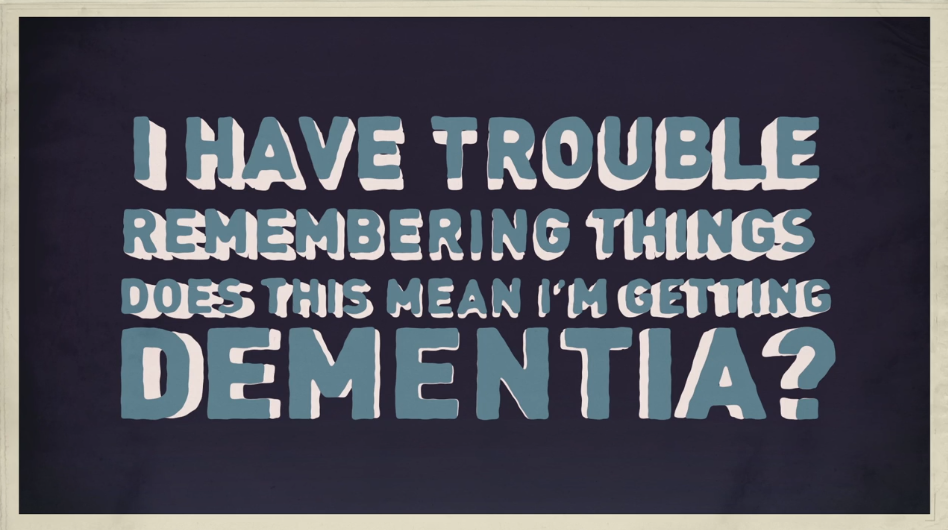
Signs and Symptoms
If you or your loved one are experiencing changes in your memory, mood or ability to manage, don’t worry alone. Take the next step and do something about it.
Below you will find information about early signs and symptoms, when you should visit your doctor, how a diagnosis is made and what treatment is available. You will also find tips on coping with memory loss.
Signs and symptoms
Often the early signs of dementia may be difficult to detect. Some people experience changes in their short term memory early on, for others changes to mood or to language may be the early signs. Each person’s experience with dementia is unique.
Early signs and symptoms may include:
- Memory loss, particularly for recent events
- Problems with language, difficulty finding the right word
- Changes in personality, mood or behaviour
- Becoming confused in familiar surroundings or situations
- Difficulty in following conversations, TV programmes or reading
- Difficulty managing money and everyday tasks
- Difficulty solving problems or doing puzzles
- Loss of interest in hobbies and pastimes, lack of initiative to start something or go somewhere.
- Repeating a question or story several times without realising
- Misplacing things by putting them in the wrong place
Most people will experience a number of these signs, and they will find they are having increasing difficulty over time. In general, signs and symptoms emerge gradually. This can be difficult for both the person who is experiencing changes and for their family and friends.
For further information:
- Visit your GP to discuss further
- Call the National Alzheimer Helpline on 1800 341 341
- Read our resources:
When should you go to the GP?
If you are worried about your memory, then you should talk to your GP without delay.
Some people may feel frightened or embarrassed but talking to your GP could make all the difference. There are a number of possible reasons for changes to memory.
You should visit your GP if you are experiencing changes to your memory, mood or ability to manage everyday life and especially if you:
- Feel your memory has changed significantly or rapidly
- Forget the names of friends or everyday objects regularly
- Find it hard to follow conversations or television programmes
- Notice that you regularly repeat yourself or lose your train of thought when speaking
- Find managing money or everyday tasks increasingly difficult
- Find it hard to remember things you have seen, read or heard
- Feel anxious, angry or frustrated by the changes you are experiencing
Tips when visiting the GP
Before you visit your GP, make a note of the changes you have noticed. Perhaps keep a diary to help you collect examples of things that are causing you to worry, when they happen and how often they are happening. This will help you to talk to your doctor about your concerns.
You may find it helpful to talk to a trusted loved one before your visit. You could ask them if they have noticed any changes and this may help you to prepare for the visit. You could also ask this person to come with you to your GP. Having someone with you can support you and also help to keep a note of what the doctor advises the next steps should be.
If you would like to talk to someone about your concerns and about visiting the GP, call the Alzheimer National Helpline.
Take the next Step
There are a number of possible reasons for changes in memory. Finding out what is happening is a positive step.
Getting an early diagnosis mean you can:
- Access appropriate treatments, services and supports
- Plan your legal and financial affairs
- Make decisions about your future
For further information:
- Visit your GP
- Call the National Alzheimer Helpline on 1800 341 341
- Read our resource
Questions to ask your doctor

When you are worried that you may have Alzheimer’s disease or a related dementia, it can be difficult to think of all the questions you want to ask when you are with the specialist or your GP. It may be the first time you are told of the diagnosis and it can be difficult to think clearly. An opportunity may be lost to get as much information as possible from the specialist or your GP.
The following are some questions you may consider asking if you are faced with a diagnosis:
- What type of dementia do I have?
- Why do you think it is Alzheimer’s disease?
- What is Alzheimer’s disease?
- Are there different stages?
- What changes can I expect?
- What causes Alzheimer’s disease? Is it hereditary?
- How do we tell the children?
- What changes do I need to make to my life?
- Can I continue to work?
- Will I be able to continue living on my own (if this is the case)? If not, what are the options? How do I access these options?
- Are there any drugs which can be used, when are they most effective and for how long? Are there any side-effects?
- Do I come back for a follow-up appointment?
- Who will notify my GP?
- What help is out there?
- How do I access these support services?
- Can I continue to drive the car? Do I need to tell my insurer of the diagnosis? Does my diagnosis affect the validity of my driving licence?
- How long can I expect to live?
- Does the diagnosis affect my life assurance policy?
- Can I travel (within Ireland or abroad)?
- Is there a special diet I should follow?
- Are there any legal or financial issues I need to consider?
- How much will my private health insurance cover contribute to the cost of my care?
- What are the latest developments in relation to research and a cure?

